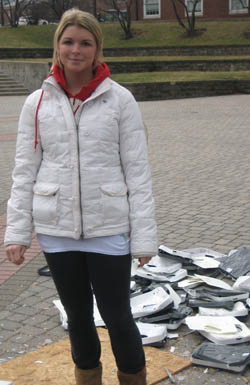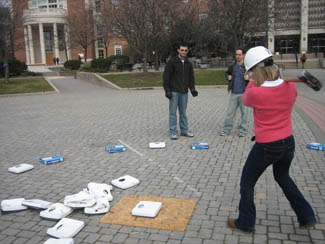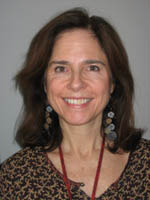 |
|||||
| Politics | Business | Schools | Justice | Health | Et Cetera |
By Paula Vasan Fallon joined other educators at universities around the country last week in discussing the prevalence of eating disorders among high school girls and college women. The University of Maryland, George Washington University and Towson University were among those hosting events to raise awareness about anorexia, bulimia and binge-eating disorders, and urging students to love their bodies. Fallon, who has been an educator for three years with the University of Maryland's Students Educating About Eating Disorders, hopes her story will help prevent other students from suffering the emotional and physical pain she endured for so many years. As a competitive swimmer, Fallon began her battle with eating disorders at age 10. "I'm a perfectionist, and I like being in control of things," she said. "I felt my weight was the only thing I could control." Fallon's routine consisted of meticulously recording every calorie she consumed during the day, followed by swimming practice and returning home to purge after snacking. Like so many other victims of eating disorders, she said the endless cycle was spurred by praise and flattery she initially received for her thinness and disciplined exercise schedule. When her once-stellar grades dropped, and weakness and constant fatigue caused her swimming to suffer, Fallon finally admitted to her mother she needed help. "But I kind of just lied to my psychiatrists and dietitians throughout high school, because I was more ashamed about purging than being anorexic," she said. "I felt my bulimia was a true sign of my spiraling out of control." The process of recovery for Fallon began during her senior year of high school, when she said she began forming better relationships and "just kind of snapped out of it," tired of her constantly sore throat, exhaustion and lies to her mother about not eating. But years of anorexia and regular binge-and-purge eating took its toll, she said. During her freshman year at the University of Maryland, she underwent two weeks of hospitalization for reoccurring throat infections and eventually had her tonsils removed, causing her to miss final exams. "That was wake-up call number 20 that I had taken it too far," she said. As one of 10 SEEDS educators, all of whom are in recovery for eating disorders, Fallon provides presentations and workshops to sororities, fraternities and a variety of other groups and health classes, sharing personal experiences with this life-threatening disease and educating about its potentially fatal consequences.
At the University of Maryland at College Park last week, male and female students took turns smashing scales with hammers, sending the message that students should avoid weighing self-esteem with a number on a scale. Towson University promoted healthy body images with personal and online eating disorder screenings, weight management consultations and a student poetry event related to body image and eating disorders. The university also invited art history and psychology professors to discuss variations of the female body in art. George Washington University's Love Your Body Week included health fairs and a jeans giveaway, allowing students to discard jeans they no longer fit into with proceeds going to charity. The National Eating Disorders Association urges women to wear jeans that fit comfortably, not fighting one's natural size and shape by dieting. "The idea is not to diet simply to fit into a pair of jeans," said Susan Haney, outreach coordinator and nurse practitioner at George Washington University. At Bowie State University, Sarita Sankey, a counselor for senior-year students, said eating disorders have not been an issue at the campus, attributing its lack of presence to the university's historically high percentage of black students. In the 2006 fiscal year, 85 percent of the undergraduate student population was African-American, according to a university document. "From my own experience, eating disorders are more cultural and present among the white community, which places a great emphasis on thinness," said Sankey. "In general, the more assimilated you are into a dominant culture, the more likely you are to have an identical frame of mind about body type." But even though eating disorders are much more likely to develop among young women compared to men and in cultures that portray the ideal and beautiful women as unrealistically thin, the disorder impacts across the board, said Dr. Jamie Fenton, a psychologist and coordinator of eating disorder services at Towson University. Cybele Hirschhorn, a senior sociology major at the University of Maryland and SEEDS member, said although she is half white and half Filipino, she felt pressure to be thin and has a history of long-term anorexia. She said her mother, a first-generation Filipino, exerted tremendous pressure on her to lose weight, equating thinness with prettiness. "In high school and college, I used to not be able to walk into a classroom without counting the number of people who were fatter and thinner than I was," Hirschhorn said. Researchers say the high price tags of eating-disorder treatment facilities, coupled with cultural stigmas of the disorder, prevent many people from seeking the physical and emotional counseling they need.
According to SEEDS, eating disorders affect 18 percent to 20 percent of all college-aged women, compared to 1.5 percent to 4 percent of the general population. Percentages of eating disorders among athletes, who are more likely to suffer from an out-of-control compulsion to exercise, are much higher, according to a 1999 research study. Linda Sindler, a nurse practitioner at Towson University involved in college health services for 25 years, said she usually discovers cases of eating disorders when college students come for different health-related reasons, such as pap smears. "It's a disease of secrets, shame and embarrassment," she said. Most patients have no desire to be identified, Sindler said. American media are a major factor for the pervasiveness of anorexia, which has the highest mortality rate of any psychiatric diagnosis, especially among women as well as gay and bisexual men, Sindler said. According to a study by the National Association of Anorexia Nervosa and Associated Disorders, a nonprofit organization based in Highland Park, Ill., 5 percent to 10 percent of anorexics die within a decade of contracting the disease and up to 20 percent will be dead after 20 years. Sindler said television, magazines and billboards everywhere show thinness as the only way to be beautiful. "They're more important things in life than dying to be thin," Fallon said.
|
||||||||||||||
|
Copyright © 2008 University of Maryland Philip Merrill College of Journalism | ||||||||||||||
| Politics | Business | Schools | Justice | Health | Et Cetera | |||||||||


